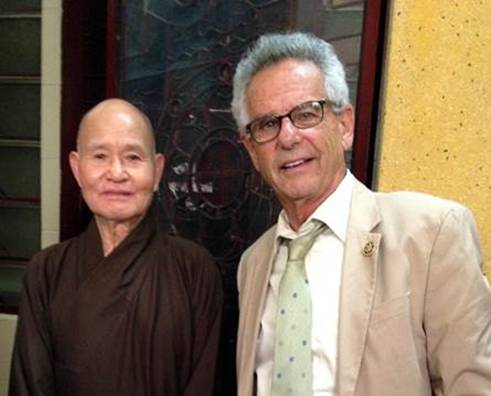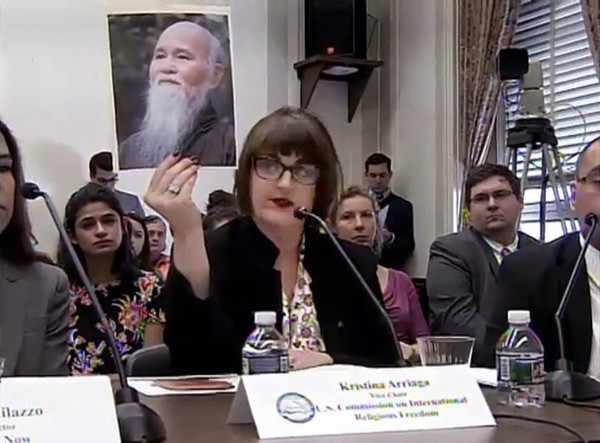PARIS, 12 April 2018 (VCHR) – US Congressman Alan Lowenthal and Kristina Arriaga, Vice Chairwoman of the US Commission for International Religious Freedom (USCIRF) announced that they have officially adopted the Most Venerable Thích Quảng Độ, Patriarch of the Unified Buddhist Church of Vietnam (UBCV) as a prisoner of conscience through the “Defending Freedoms Project” of the US Congress’ Tom Lantos Human Rights Commission. The announcement is posted on the websites of the Commission and USCIRF.
The Defending Freedoms Project, founded in 2012 by the Tom Lantos Human Rights Commission, USCIRF and a coalition of prominent human rights NGOs, aims to increase attention to human rights abuses by encouraging Members of Congress to advocate on behalf of prisoners of conscience wherever they may be found. By taking on a prisoner’s case, the Member can contribute to the release, reduction of a prison sentence or the improvement of prison conditions, while also raising awareness about the unjust laws or policies that led to imprisonment.

“The Patriarch has suffered decades of oppression and imprisonment for nothing more than standing up for his universal right of religious freedom. I am proud to be his advocate and I will continue to fight for his release,” said Congressman Lowenthal, a Democrat who represents “Little Saigon” in California, one of the largest Vietnamese-American communities in the USA. In 2015, Congressman Lowenthal visited Thích Quảng Độ during a trip to Vietnam and recently urged US Ambassador Dan Kritenbrink to press the Vietnamese authorities for his release.

USCIRF Vice Chairwoman Kristina Arriaga, who will speak on the situation of Thích Quảng Độ at USCIRF’s 20th Anniversary in Washington D.C. next week, stressed the need for improvements in freedom of religion or belief in Vietnam: “If Vietnam wants to be part of the international community, it must not treat religious liberty as the poor sister of the human rights’ family. Without religious freedom, no other rights exist.”
Most Venerable Thích Quảng Độ, Fifth Supreme Patriarch of the independent UBCV is under house arrest without charge at the Thanh Minh Zen Monastery in Ho Chi Minh City (Saigon). He is under constant Police surveillance and denied basic citizenship rights. A renowned scholar, outspoken dissident and 16-times Nobel Peace Prize nominee, Thích Quảng Độ has spent over three decades in detention for his advocacy of religious freedom, human rights and democracy. He is a recipient of the World Movement for Democracy’s “Democracy Courage Tribute” and the Norwegian Rafto Foundation’s prestigious Rafto Prize for human rights defenders for his role as a “unifying force” and a “symbol of the growing democracy movement” in Vietnam.
The adoption of Thích Quảng Độ, who is Vietnam’s longest-detained prisoner of conscience, shines a welcome light on the current brutal crackdown on freedom of expression, religion and assembly in Vietnam. This month, seven members of the Brotherhood for Democracy received sentences of up to 15 years in prison for peaceful human rights activities. There are an estimated 130 prisoners of conscience in Vietnam.
This post is also available in:
 Quê Me Quê Me: Action for democracy in Vietnam & Vietnam Committee on Human Rights
Quê Me Quê Me: Action for democracy in Vietnam & Vietnam Committee on Human Rights



